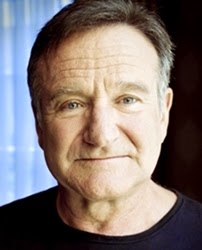—STEPHEN FRY
Last night, we watched “World’s Greatest Dad,” a black comedy starring Robin Williams. He plays an English teacher whose son accidentally kills himself. To hide the truth, the grieving father types a suicide note, which makes everyone feel guilty for the way they treated the kid—even if he was a jerk. As the dead boy’s fame grows, his father “finds” his journal, and it lands on the bestseller list. Soon a celebrity himself, Williams, as the dad, tells a talk-show audience, “Remember, suicide is a permanent solution to a temporary problem.”
 |
| ROBIN WILLIAMS (July 21, 1951 – August 11, 2014) |
I can only imagine how alone he must have felt at the end.
Reaction to his death this week ranged from the eloquent to the heartless: “Cowardly.” “Selfish.” “A choice, not a disease.” Is it any wonder those of us who struggle with depression are afraid to speak up?
If you’ve never known the feeling, well, God bless you. I don’t mean a sad mood that lasts for a week or two and goes away. We’re talking months or even years. (I lost part of the ’90s.) The black cloud descends. The music stops. You can’t remember the point of getting up in the morning.
Here’s the thing: I have an amazing life. Wonderful family and friends—people who love me. Surely Robin Williams would have said the same. The worst part about depression is that you know you have no right to feel this way, hence the shame and isolation. Nobody likes a whiner. Cheer up! Quit feeling sorry for yourself! Happiness is a choice. Plenty of people are a lot worse off than you. Think of all the things you have to be grateful for!
It’s a little like yelling at a diabetic for having low blood sugar.
And if you’re like me, you yell at yourself all the time. Hopelessness doesn’t begin to describe the feeling as time wears on, and the pep talks aren’t working. Especially if you’ve been there before. You can work hard, get healthy again, be strong for ages, and boom—you’re back to square one. Pushing a boulder up a hill.
In time, you get really good at keeping up a front. You become a pro at seeming “normal.” Happy, even. God forbid you let anyone see how lost you are. People might worry. A glass of wine always helps to get you talking. Otherwise, you’d sit there like a stone. After a visit with friends, you’re wrung out for days. The effort is exhausting.
The tragedy of depression is that it feels like forever, but it isn’t. With help—counseling, medication, whatever it takes—the darkness lifts. You find out there’s joy and laughter on the other side, more life to be lived. Sadly, some sufferers don’t last that long. They make a desperate decision, borne out of fear or pain or loneliness (often compounded by drugs or alcohol), and at the funeral, friends say, “We had no idea he was that bad off...”
We often think of suicides as planned, with warning signs that can’t be missed. New research shows that as many as 80% of suicides are impulsive, a reaction to short-term crisis. In a study published in The New England Journal of Medicine, 153 survivors of near-lethal suicide attempts were asked, “How much time passed between the time you decided to commit suicide and actually attempted it?” For 1 in 4 responders, the answer was less than five minutes. Fully three-quarters of the group said it was under an hour. Change the scenario a bit—say there wasn’t a gun in the house or a bottle of pills in the medicine cabinet—and they might wake up on the couch the next morning with nothing worse than a hangover.
Here’s a list of people who attempted suicide and went on to great things, including Halle Berry, Greg Louganis, Mike Wallace, Billy Joel, Elton John, Clark Gable and Walt Disney. They thought the world would be a better place without them. Imagine all we would have missed.
Lest you worry that I’m preoccupied with self-destruction, well, you’re probably right, but in a way that keeps me from doing it. Years ago, my dear friend Brian put a bullet through his head. He was gifted, funny, bright—had his whole life to live. All who knew him were shattered. To this day, I still wonder what might have happened if I’d called him that night, like I meant to. How arrogant, to think I could have talked him out of it, but still...
Regret is a thing you live with. I couldn’t do that to the people I love.
Which tells you how much Robin Williams must have been suffering. There isn’t a doubt in anyone’s mind about the size of his heart. He loved his family, maybe more than life itself. We’ll never know the demons he wrestled with, but we have no right to judge him. None.
If you’re experiencing depression, be brave and ask for help. Don’t try to go it alone. Talk to a doctor, a minister, a therapist, a friend—someone who can walk you through it. Depression isn’t a moral failure. It’s a medical illness with multiple factors, including genetics, environment, and chemical imbalances in the brain. One in ten Americans report depression at some point in their lives. If you know someone who’s struggling, Stephen Fry said it best:
“Try to understand the blackness, lethargy, hopelessness, and loneliness they’re going through. Be there for them when they come through the other side. It’s hard to be a friend to someone who’s depressed, but it is one of the kindest, noblest, and best things you will ever do.”
And trust me, we will love you for it, always.
Well said Dear Alison...
ReplyDelete